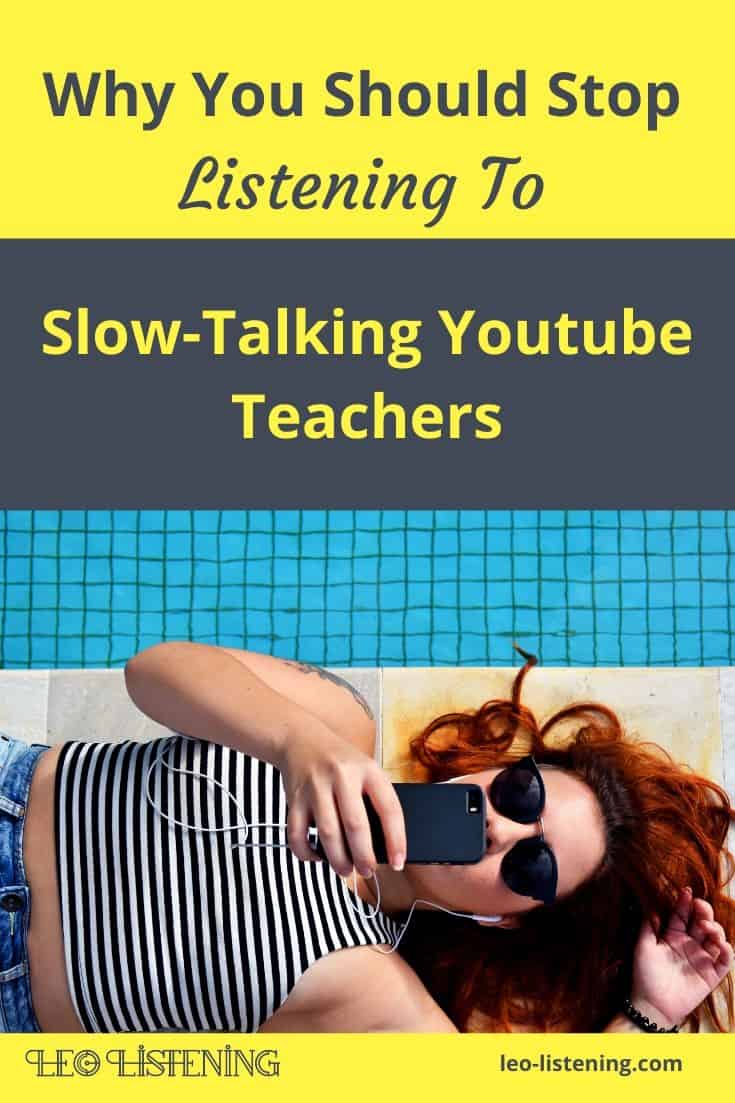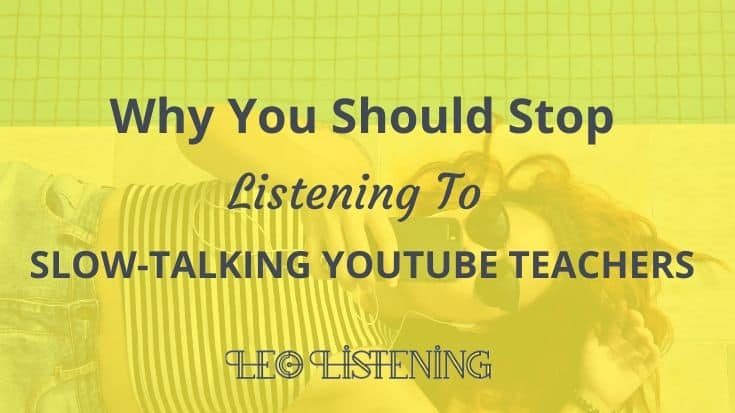So I should add a subheading here.
I have no problem with slow talking YouTube teachers.
When you teach a language for a living, your job is to make it accessible. And that means talking in a more slow and clear way.
When I trained to teach English, I had to learn to explain things as simply as possible. And find ways to check my students’ understanding, without simply saying “do you understand”?
When I speak “normally” to English learners, in other words, fast, without articulating properly, I feel like I’m going against my profession.
To clarify further, if you want to learn a grammar point, or some new vocabulary, and prefer watching YouTube to picking up a book, then a slow-talking YouTube teacher is exactly what you need.
If a teacher is explaining a complex grammar point while talking fast, not articulating properly and using a bunch of slang, then they’re not doing their job right. It’s as simple as that.
The Problem With Slow-Talking YouTube Teachers For Your Listening Skills
But if you want to understand native English speakers when they talk fast and if you want to speak in the same way, then you need to listen to fast, messy spoken English.
Listening to slow-talking YouTube teachers will not help you if that’s your goal. They will help you understand grammar and vocab or learning strategies. But that’s it.
It’s the same reason I discourage people from listening to any kind of academic monologue:
- TED talks – this is a slow monologue with visual information, not a fast dialogue between two or more English speakers which is what I think you want to understand
- Documentaries – I love watching documentaries. Again, the problem is that most documentaries are slow monologues on top of images. I know they’re not all the same. But if your goal is to understand fast conversational English, you won’t hear much of that in a documentary.
- The News – ok, so some news broadcasters do speak quite fast. But again, this is a monologue with plenty of images and text to help you understand. It’s not conversational.
- Certain podcasts – the best podcasts for improving your conversational English listening skills are interview podcasts between 2 or more speakers. But not all podcasts are like this. Some are monologues. Some are closer to the news or a documentary in style. Where possible, try to listen to conversational, interview podcasts.
- Audiobooks – I love listening to audiobooks too. But the problem is that audiobooks are slower than the speed of real conversation. Even if your book is fiction and contains dialogue, the audiobook narrator might not read it at real conversational speed.

Watch the video:
When Watching YouTube Teachers Can Help Your Listening Skills
Now, of course, if they make a video of themselves or maybe them talking fast to another native English speaker, then that can help.
Especially if they take the time to break down their speech after and explain why it was so hard to catch. That’s what a true listening teacher would do.
But if they’re just explaining grammar or something, then they won’t be speaking fast.
It doesn’t matter if they’re a native speaker. No native speaker will ever talk to you like that in the street.
Understand Fast Spoken English To Pick Up Grammar And Vocabulary Naturally
So, if your goal is to understand fast English, you need to go out and listen to it.
And your efforts will be rewarded, because once you understand that type of speech better, you’ll catch and pick up new expressions and reinforce your grammar knowledge.
That’s right, you won’t have to come to YouTube and listen to slow-talking teachers explain grammar and vocabulary. You can use your improved listening skills to pick up the grammar and vocabulary naturally.
What Can You Listen To Instead Of Slow-Talking YouTube Teachers To Improve Your English Listening Skills?
So what can you listen to instead? Well, you can listen to material where you’re more likely to hear conversational English.
Here are 2 recommendations:
- Interviews. I love using interviews from the Ellen Show or other talk shows with my students because Ellen and her guests use “real” fast spoken English. You could also listen to podcasts that are interviews. If your favourite YouTube teachers bring on guests to interview then you can use that material too.
- Movies and TV shows. I love helping learners with these because of the motivation factor. It’s much easier to get people to do tough listening tasks like dictations when they’re watching something they enjoy. Also, the dialogue in movies and TV shows can be quite close to real-life dialogue.
The key to going beyond just listening and actually understanding and using fast-spoken English in your own speech is to have some text. That can be a transcript or subtitles.
When you have a text, you can check your understanding. You can do dictations.
And the best situation of all is when you can work with a teacher who can explain to you why you didn’t catch what you missed. And break down all the little details of fast spoken English for you.
Prepare Your Listening For Real Life Conversations With Native English Speakers
So to sum up, keep listening to slow-talking YouTube teachers if you want. But don’t come complaining to me when you can’t understand native speakers when they talk to you in the street.
Teacher English and real English are often two very different things. And unfortunately, you can’t prepare for real life by just listening to YouTube teachers.
It’s like training for a marathon by just doing a couple of laps around the park. You’re just going to hurt yourself and get disappointed.
